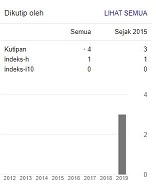PENGARUH PENERBITAN SAHAM DAN OBLIGASI TERHADAP SUSTAINABILITY DISCLOSURE DENGAN MODERASI PENGAWASAN DAN PENGARUH KELUARGA
Abstract
Tujuan dari penelitian ini menganalisis pengaruh penerbitan saham dan obligasi
terhadap sustainability ddisclosure dengan pengawasan dan pengaruh keluarga sebagai variabel moderating. Pengambil sampel berdasarkan pada perusahaan yang terdaftar di Bursa Efek Indonesia yang telah menerbitkan sustainability disclossure pada tahun 2013 – 2015. Metode puposive sampling merupakan metode pemilihan sampel yang digunakan. Ordinary least squre merupakan teknik analisis yang digunakan. Hasil pengungkapan bahwa penerbitan saham tidak berpengaruh secara positif tehadap sustainability disclosure, akan tetapi penerbitan obligasi yang berpengaruh secara positif signifikan terhadap sustainability disclosure. Selain daripada itu bahwa variabel moderating pengawasan dan pengaruh keluarga tidak dapat memoderasi hubungan antara penerbitan saham dan obligasi dengan sustainability disclosure.
Keywords
Full Text:
PDFReferences
Ali, A., Chen, T. and Radhakrishnan, S. (2007). Corporate disclosures by
family firms. Journal of Accounting and Economics, Vol. 44 No. 2, pp. 238-286.
Anderson, R.C. and Reeb, D.M. (2003). Founding-family ownership and
firm performance: evidence from the S&P 500. Journal of Finance, Vol. 58 No. 3, pp. 1301-1328.
Campopiano, G. and De Massis, A. (2014). Corporate social responsibility reporting: a content analysis in family and non-family firms. Journal of Business Ethics, Vol. 129 No. 3 , pp. 511-534.
Chua, J.H., Chrisman, J.J., Steier, L.P. and Rau, S.B. (2012). Sources of
heterogeneity in family firms: an introduction. Entrepreneurship Theory and Practice, Vol. 36 No. 6, pp. 1103-1113.
El Ghoul, S., Guedhami, O., Kwok, C.C. and Mishra, D.R. (2011). Does
corporate social responsibility affect the cost of capital? Journal of Banking & Finance, Vol. 35 No.9, pp. 2388-2406.
Gamerschlag, R., Mo¨ller, K., & Verbeeten, F. (2011). Determinants of voluntary CSR disclosure empirical evidence from Germany. Review of
Managerial Science, Vol. 5, pp. 233–262.
Gao, F., Dong, Y., Ni, C. and Fu, R. (2016). Determinants and economic consequences of nonfinancial disclosure quality. European Accounting Review, Vol. 25 No. 2, pp. 287-317.
Gavana, G. (2017). The effect of equity and bond issues on sustainability
disclosure. Family vs non-family Italian firms. Social Responsibility
Journal, Vol. 13, pp. 126-142.
Gomez-Mejia, L.R., Haynes, K.T., Nunez-Nickel, M., Jacobson, K.J.L. and Moyano-Fuentes, J. (2007). Socioemotional wealth and business risks in familycontrolled firms, evidence from Spanish olive oil mills.
Administrative Science Quarterly, Vol. 52 No. 1, pp. 106-137.
GRI. (2013). G4 SUSTAINABILITY REPORTING GUIDELINES. Retrieved April 2017, from http://www.globalreporting.org/res ourcelibrary/Bahasa-Indonesia-G4-Part-Two.pdf
H, W. (2008). Does the market value corporate environmental responsibility? An empirical examination. Corporate Social Responsibility and Environmental Management, Vol.15 No. 2, pp. 89–99.
Hooghiemstra, R. (2000). Corporate communication and impression
management—New perspectives why companies engage in corporate social reporting. Journal of Business Ethics, Vol. 27, pp. 55–68.
Hussainey K, Salama A. (2011). The importance of corporate environmental reputation to investors. J Appl Account Res, Vol.11 No.3, pp. 229–241.
Iyer, V. and Lulseged, A. (2013). Does family status impact US firms’
sustainability reporting? Sustainability Accounting, Management and Policy Journal, Vol. 4 No. 2, pp. 163-189.
Jensen, M.C. and Meckling, W.H. (1976). Theory of the firm: managerial
behavior, agency costs and ownership structure. Journal of Financial Economics, Vol. 3 No.4, pp. 305-360.
Murray, A., Sinclair, D., Power, D. and Gray, R. (2006). Do financial
markets care about social and environmental disclosure? Further evidence and exploration from the UK. Accounting, Auditing & Accountability Journal, Vol. 19 No. 2, pp. 228-255.
Nakao Y, Amano A, Matsumura K, Genba K, Nakano M. (2007). Relationship between environmental performance andfinancial performance: An empirical analysis of Japanese corporations. Business Strategy and the Environment, Vol.16 No.2, pp. 106–118.
Reverte, C. (2011). The impact of better corporate social responsibility
disclosure on the cost of equity capital. Corporate Social Responsibility and Environmental Management, Vol. 19 No. 5,, pp. 253-272.
Reverte, C. (2014). Corporate social responsibility disclosure and market valuation: evidence from Spanish listed firms. Review of Managerial Science, Vol. 10 No.2, pp. 411-435.
Robinson M, Kleffner A, Bertels S. (2011). Signaling sustainability leadership: empirical evidence of the value of DJSI membership. J
Bus Ethics, pp. 493–505.
Schadewitz, H. and Niskala, M. (2010). Communication via responsibility
reporting and its effect on firm value in Finland. Corporate Social
Responsibility and Environmental Management, Vol. 17 No. 2, pp. 96-106.
Weber O, Scholz RW, Michalik G. (2010). Incorporating sustainability criteria into credit risk management. Business Strategy and the Environment, Vol.19 No. 1 , pp. 39–50.
DOI: http://dx.doi.org/10.53712/jmm.v4i1.535
Refbacks
- There are currently no refbacks.
Indexing:
Aliansi:
Reference Manager:
View Statistic
Published by Prodi Manajemen Fakultas Ekonomi Universitas Madura
Jl. Raya Panglegur Km 3,5 Pamekasan
Phone: (0324) 322231
website: http://ejournal.unira.ac.id/index.php/jurnal_makro_manajemen/index
Email: makro@unira.ac.id
MAKRO by Universitas Madura is licensed under a Creative Commons Attribution 4.0 International License.







